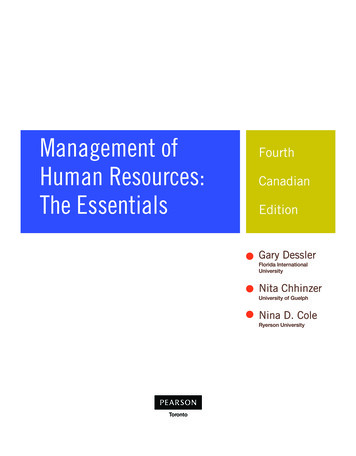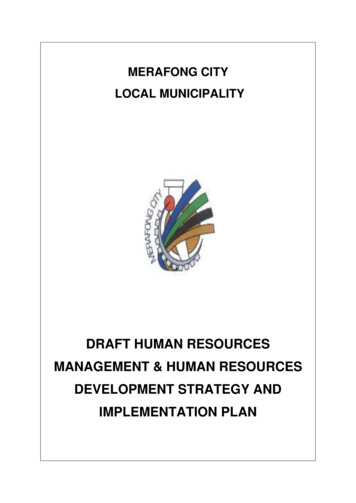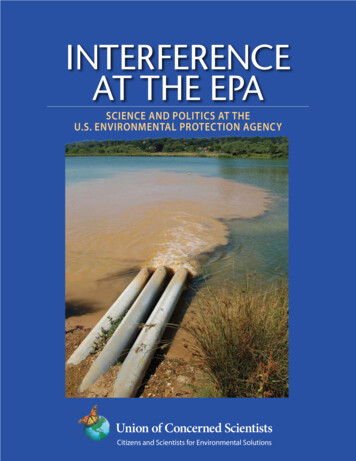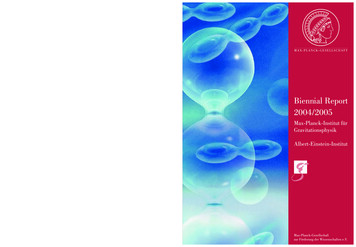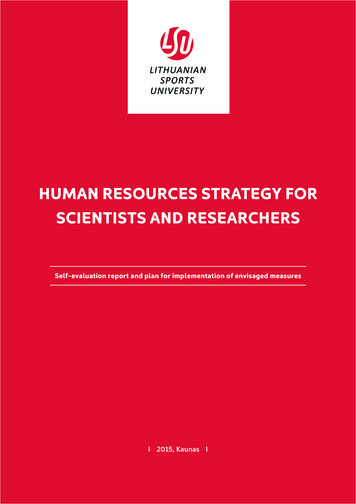
Transcription
HUMAN RESOURCES STRATEGY FORSCIENTISTS AND RESEARCHERSSelf-evaluation report and plan for implementation of envisaged measuresI 2015, Kaunas I
INTRODUCTIONThe sources of Lithuanian Sports University (LSU) trace back to 1934, when the Higher Courses of PhysicalEducation (HCPE) were set up offering a higher education degree in Physical Education. The Statutedefined the aim of the HCPE: “Todevelop Sport Science and train Physical Education and military trainingteachers for further educational institutions and secondary schools.” The HCPE were closed in 1938 andtheir function to train Physical Education teachers and military training leaders was given over to VytautasMagnus University, the Faculty of Humanities.As an independed higher education institution, Lithuanian State Institute of Physical Education wasfounded in 1945. The Institute was renamed into Lithuanian Academy of Physical Education (LAPE) in1999; in 2012,the Academy was renamed into Lithuanian Sports University (LSU). From its earliest yers,LSU has remained a unique higher education institution, preparing Physical Education, Sports and HealthPromotion professionals.LSU is an important centre of Sports Science and a promoter of values and traditions of physical educationand sports. It has prepared 14.000 Physical Education teachers, highly qualified coaches of varioussports, physical therapy professionals, tourism and sports managers, etc.A lot of famous scientists,world famous coaches and public figures graduated from the University. Moreover, a significant numberof LSU students have become the winners of the Olympic Games, European and world champions andwinners.European boxing champion A. Šocikas, the Olympic gold medal winner and basketball worldchampion M. Paulauskas, the Olympic champions V. Chomičius, R. Kurtinaitis, V. Alekna and A. Skujytė tobe mentioned among the others.Vision: LSU wants to become one of the leading universities of sports, physical education, rehabilitation(physical therapy) and health sciences in Europe. LSU endeavours to become a leading sports, physicaltherapy and health science university in the Baltic Sea region through its uniqueness in sport, physical therapyand health promotion, and appropriate application of sports science in studies and innovations by 2017.Mission: Promote coherant progress of the society, and be useful to it providing exclusive internationallevel research and studies in sports science.VALUES:1. Respect for the exclusive knowledge, ensuring the unity of science and education, development ofongoing progress.2. Thorough promotion of new ideas, initiatives, innovations, professionalism and leadership.3. Accessibility and quality assurance of academic services for Lithuanian and foreign schoolchildren andstudents, the community of employees and seniors as well as business and public sector institutions.4. Promotion of active dialogue with national and foreign partners.5. Teamwork based on mutual respect, tolerance, competence and trust.6. Promotion, development and testimony of respect for healthy lifestyle and Olympic ideas.7. Promotion of citizenship and patriotism.
SELF-EVALUATION REPORT1. ProcedureIn spring of 2014, an informal working group was formed by mutual agreement made by the Rector, ViceRector for Studies and Vice-Rector for Research. The working group was formed in accordance with thefollowing criteria: All areas of science at LSU (Social and Biomedical Sciences) shall be represented in equal proportion, Members of the working group shall have exercised different functions (administrative as well asacademic), Members of the working group shall be acquainted to different processes at the University andcorresponding internal legal acts, Members of the working group shall work with the students of different cycles of studies(undergraduate, graduate and post-graduate), Members of the working group shall have experience in the implementation of projects of differentnature. The working group was composed of the following members of LSU academic community,belonging to different levels of the University management structure:
MEMBER OF THEWORKING GROUPACADEMIC WORKPARTICIPATION IN LSUMANAGEMENT Chief researcher; Head of a group ofscientists Professor at the Department ofCoaching ScienceChief researcher; Head of agroup of scientists Professor at the Department of Health,Physical and Social Education Member of Teacher and ResearcherAdmission Committee Head of a group of scientistsMember of the Senate Head of the Departmentof Health, Physical andSocial Education Head of a strategicresearch areaProfessor at the Department of Health,Physical and Social Education Member of the Senate Member of the Academicand Professional EthicsCommissionJŪRATĖ POŽĖRIENĖDirector of a studyprogramme Associate Professor at the Departmentof Applied Biology and Rehabilitation Member of a group of scientistsDIANARĖKLAITIENĖHead of the Departmentof Applied Biology andRehabilitation Associate Professor at the Departmentof Applied Biology and Rehabilitation Member of a group of scientistsSIGITASKAMANDULISADMINISTRATIVE WORKDirector of the Instituteof Sport Science andInnovationsROMUALDASMALINAUSKASSAULIUS ŠUKYS Associate Professor at the Departmentof Applied Biology and Rehabilitation Researcher at the Institute of SportScience and Innovations Member of a group of scientistsDAIVA SKIENĖHead of the Office ofPersonnel and Law Lecturer at the Department of SportManagement, Economics and Sociology Member of a group of scientistsHead of the Office ofDoctoral Studies andResearch Lecturer at the Department of Health,Physical and Social Education Member of a group of scientistsMember of the RectorateThe main objective of the working group was to look into the principles of the Charter and the Code,determinethe methods for analysis performance, identify the main strengths and weaknesses and develop aproject of Human Resources Strategy for Scientists and Researchers taking into account the Strategy for theDevelopment of Integrated Activities at Lithuanian Sports University for the year of 2012-2017.The following methods have been applied in the development of Human Resources Strategy for Scientistsand Researchers: Working groups. During the development of Human Resources Strategy for Scientists andResearchers, 4 meetings of the working group took place to discuss the principles of the Charter andthe Code and their implementation at LSU: existing procedures, rules and practice. Each memberof the working group was obliged to organize and conduct discussions in their divisions or broadergroups; the issues arisen in discussions were presented in the meetings of the working group. Allmembers of the working group belong to at least one academic unit. Therefore, they consultedother members of academic community and students on the implementation of the principles ofthe Charter and the Code at LSU.
Analysis of internal documents. The aim was to evaluate the existing system and applicable internallegal acts under the proposed self-evaluation template in order to identify the discrepanciesbetween the existing procedures and the Code and the Charter.The process of the development of Human Resources Strategy for Scientists and Researchers:Presentation of theCharter and the Code tothe working groupComparison of internaland external legalacts and processeswith the principles ofthe Charter and theCode; identification ofdiscrepanciesProject developmentfor Human ResourcesStrategy for Scientistsand ResearchersGeneralization of theanalysis data in theworking groupMeetings of the membersof the working group withthe community in order todetail discrepancies andidentify the strengths ofthe UniversityConsideration of theprojectof HumanResources Strategyfor Scientists andResearchersApproval of HumanResources Strategyfor Scientists andResearchersPresentation of the aimand objectives of Strategydevelopment to theworking groupIn order to ensure the implementation of Human Resources Strategy for Scientists and Researchers,a Committee has been establishedby the Rector’s Order. The Committee, consisting of a studentrepresentative, a representative of Social Sciences and Biomedical Sciences,a representative of theTrade Union and a representative of the University Administration, was responsible for the monitoringof the Strategy implementation and the performance of further self-evaluation.
2. OUTCOMES OF SELF-EVALUATIONEthical and professional aspectsLEVEL OF PRINCIPLE IMPLEMENTATION ATTHE UNIVERSITYPRINCIPLEPRINCIPLE DESCRIPTIONResearchers can organize themselves into groupsof scientists or carry out research in accordancewith an approved individual research programme.Such programmes are approved by the Senateand must comply with the strategic researchareas.RESEARCHFREEDOMResearchers should focus their research forthe good of mankind and for expanding thefrontiers of scientific knowledge, while enjoyingthe freedom of thought and expression, andthe freedom to identify methods by whichproblems are solved, according to recognisedethical principles and practices. Researchersshould, however, recognise the limitations to thisfreedom that could arise as a result of particularresearch circumstances (including supervision/guidance/management) or operationalconstraints, e.g. for budgetary or infrastructuralreasons or, especially in the industrial sector,for reasons of intellectual property protection.Such limitations should not, however, contravenerecognised ethical principles and practices, towhich researchers have to adhere.ETHICALPRINCIPLESResearchers should adhere to the recognisedethical practices and fundamental ethicalprinciples appropriate to their discipline(s) aswell as to ethical standards as documented in thedifferent national, sectorial or institutional Codesof Ethics.The University has approved OversightCommitteeRegulations on Bioethics and SocialScience Research Ethics.PROFESSIONALRESPONSIBILITYResearchers should make every effort to ensurethat their research is relevant to society and doesnot duplicate research previously carried outelsewhere. They must avoid plagiarism of anykind and abide by the principle of intellectualproperty and joint data ownership in the caseof research carried out in collaboration witha supervisor(s) and/or other researchers. Theneed to validate new observations by showingthat experiments are reproducible should notbe interpreted as plagiarism, provided thatthe data to be confirmed are explicitly quoted.Researchers should ensure, if any aspect of theirwork is delegated, that the person to whom it isdelegated has the competence to carry it out.Research in Biomedical Sciences is carried out atthe University upon the receipt of authorizationof the Biomedical Research Ethics Committee.PROFESSIONALATTITUDEResearchers should be familiar with the strategicgoals governing their research environmentand funding mechanisms, and should seekall necessary approvals before starting theirresearch or accessing the resources provided.They should inform their employers, funders orsupervisor when their research project is delayed,redefined or completed, or give notice if it is tobe terminated earlier or suspended for whateverreason.Researchers at all levels must be familiar withthe national, sectorial or institutional regulationsgoverning training and/or working conditions.This includes Intellectual Property Rightsregulations, and the requirements and conditionsof any sponsor or funders, independently ofthe nature of their contract. Researchers shouldadhere to such regulations by delivering therequired results (e.g. thesis, publications, patents,reports, new products development, etc.) as setout in the terms and conditions of the contract orequivalent document.Researchers are introduced to safety instructionsat work, job descriptions, qualificationrequirements and internal legal acts applicable totheir post during their recruitment.CONTRACTUALAND LEGALOBLIGATIONSThere is a new Research Activity Regulationproject developed, which will be submitted to theUniversity Senate in the nearest future. Accordingto the Regulation, only strategic research areaswill have to be approved by the University Senate;researchers will be able to organize themselvesinto groups of scientists more flexibly, whichwill even more ensure the principle of researchfreedom.The University has the Code of Academic andProfessional Ethics, which describes researchwork provisionsapplied at the University.On 10 October 2013,Project Preparation,Implementation and Monitoring Procedures,covering research project activities, wasapproved.
ACCOUNTABILITYResearchers need to be aware that they areaccountable towards their employers, fundersor other related public or private bodies as wellas, on more ethical grounds, towards society as awhole. In particular, researchers funded by publicfunds are also accountable for the efficient useof taxpayers' money. Consequently, they shouldadhere to the principles of sound, transparent andefficient financial management and cooperatewith any authorised audits of their research,whether undertaken by their employers/fundersor by ethics committees.In accordance with the Law of the Republic ofLithuania, the University is accountable for theprojects carried out by the researchers workingat the University. The University performsaccounting in accordance with the Laws of theRepublic of Lithuania and internal legal acts.Methods of collection and analysis, the outputsand, where applicable, details of the data shouldbe open to internal and external scrutiny,whenever necessary and as requested by theappropriate authorities.Researchers are introduced to safety instructionsat work during their recruitment.GOOD PRACTICEIN RESEARCHResearchers should at all times adopt safe workingpractices, in line with national legislation, includingtaking the necessary precautions for healthand safety and for recovery from informationtechnology disasters, e.g. by preparing properback-up strategies. They should also be familiarwith the current national legal requirementsregarding data protection and confidentialityprotection requirements, and undertake thenecessary steps to fulfil them at all times.DISSEMINATION,EXPLOITATION OFRESULTSAll researchers should ensure, in compliance withtheir contractual arrangements, that the results oftheir research are disseminated and exploited, e.g.communicated, transferred into other researchsettings or, if appropriate, commercialised. Seniorresearchers, in particular, are expected to take alead in ensuring that research is fruitful and thatresults are either exploited commercially or madeaccessible to the public (or both) whenever theopportunity arises.Public scientific seminars take place at theUniversity, during which researchers have theopportunity to present the research carried outand their results.PUBLICENGAGEMENTResearchers should ensure that their researchactivities are made known to society at largein such a way that non-specialists, therebyimproving the public’s understanding of science,can understand them. Direct engagementwith the public will help researchers to betterunderstand public interest in priorities for scienceand technology and also the public's concerns.NONDISCRIMINATIONEmployers and/or funders of researchers willnot discriminate against researchers in any wayon the basis of gender, age, ethnic, national orsocial origin, religion or belief, sexual orientation,language, disability, political opinion, social oreconomic condition.On 19 April 2011, the Council of LSU approvedteacher and researcher selection and evaluationprinciples, describing non-discrimination andtransparent recruitment.Employers and/or funders should introduce forall researchers, including senior researchers,evaluation/appraisal systems for assessing theirprofessional performance on a regular basisand in a transparent manner by an independent(and, in the case of senior researchers, preferablyinternational) committee.Lecturer and researcher assessment systemis provided in the Procedure on Lecturer andResearcher Certification and Competition forFilling Vacancies Description, amended bythe Senate on 5 March 2015and QualificationRequirements for Determining Lecturer andResearcherOfficial Salary Coefficient.In such evaluation and appraisal proceduresoverall research creativity and results shouldbe taken into account, e.g. publications,patents, management of research, teachingand (or) lecturing, supervision, consultation andcooperation at national and international levels,administrative duties, public awareness activitiesand mobility. These criteria should be discussed inthe context of career advancement.These documents indicate that academicpersonnel is assessed by internationalrecruitment committee, composed of the leadingscientists of the University.EVALUATION/APPRAISALSYSTEMSOpen lectures are delivered at the University ofthe Third Age; Saturday School for the public isorganized.
WEAKNESSES: Intellectual and general property principles and compliance procedures are not defined. There is no system ensuring the usefulness of the research carried out to the public. There is still no established practice of giving publicity to the research results.RECRUITMENTThe University lecturers and researchers shall be recruited in accordance with the provisions set forth by theLaw on Higher Education and Research of the Republic of Lithuania: through an open competition with theobjective criteria provided depending on the post to be appointed to.An employment contract of unlimitedduration for holding the position shall be concluded with a person who has the second time in successionwon the competition to hold the same position. Performance evaluation shall be carried out every five years.PRINCIPLEPRINCIPLE DESCRIPTIONEmployers and/or funders should ensure that the entryand admission standards for researchers, particularly atthe beginning at their careers, are clearly specified andshould also facilitate access for disadvantaged groups or forresearchers returning to a research career, including teachers(of any level) returning to a research career. Employers and/or funders of researchers should adhere to the principlesset out in the Code of Conduct for the Recruitment ofResearchers when appointing or recruiting researchers.RECRUITMENTEmployers and/or funders should establish recruitmentprocedures, which are open, efficient, transparent, supportive,and internationally comparable, as well as tailored to thetype of positions advertised. Advertisements should give abroad description of knowledge and competencies required,and should not be so specialised as to discourage suitableapplicants. Employers should include a description of theworking conditions and entitlements, including careerdevelopment prospects. Moreover, the time allowedbetween the advertisement of the vacancy or the call forapplications and the deadline for reply should be realistic.SELECTIONSelection committees should bring together diverseexpertise and competences and should have an adequategender balance and, where appropriate and feasible, includemembers from different sectors (public and private) anddisciplines, including from other countries and with relevantexperience to assess the candidate. Whenever possible, awide range of selection practices should be used, such asexternal expert assessment and face-to-face interviews.Members of selection panels should be adequately trained.TRANSPARENCYCandidates should be informed, prior to the selection, aboutthe recruitment process and the selection criteria, the numberof available positions and the career development prospects.They should also be informed after the selection processabout the strengths and weaknesses of their applications.LEVEL OF PRINCIPLEIMPLEMENTATION AT THE UNIVERSITYRecruitment procedure is open,transparent and covering various aspectsof the work of a researcher.A recruitment commission consists ofLithunian and foreign researchers ofSocial and Biomedical Sciences.The procedure and selection criteria forlecturer and researcher recruitmentarealways available on the websites of theUniversity and the Research Council ofLithuania.The competition includes variousselection methods: expert assessment,face-to-face interviews, etc.The selection process takes intoconsideration the whole range ofexperience of candidates (publications,educational experience, experimentaldevelopment, participation in variousprojects, international mobility, etc.).Candidates for the position of anassociate professor or a professor musthave experience of teaching in a highereducation institution; candidates forthe position of a lecturer must have 2years of teaching experience in a highereducation institution or 5 years ofpractical experience in working in areasrelated tothe University activities.
VARIATIONSIN THECHRONOLOGICALORDER OF CVSCareer breaks or variations in the chronological order ofCVs should not be penalised, but regarded as an evolutionof a career, and consequently, as a potentially valuablecontribution to the professional development of researcherstowards a multidimensional career track. Candidatesshould therefore be allowed to submit evidence-basedCVs, reflecting a representative array of achievements andqualifications appropriate to the post for which application isbeing made.RECOGNITIONOF MOBILITYEXPERIENCEAny mobility experience, e.g. a stay in another country/region or in another research setting (public or private) ora change from one discipline or sector to another, whetheras part of the initial research training or at a later stage ofthe research career, or virtual mobility experience, shouldbe considered as a valuable contribution to the professionaldevelopment of a researcher.RECOGNITION OFQUALIFICATIONSEmployers and/or funders should provide for appropriateassessment and evaluation of the academic and professionalqualifications, including non-formal qualifications, of allresearchers, in particular within the context of internationaland professional mobility. They should inform themselvesand gain a full understanding of rules, procedures andstandards governing the recognition of such qualificationsand, consequently, explore existing national law, conventionsand specific rules on the recognition of these qualificationsthrough all available channels.SENIORITYThe levels of qualifications required should be in line withthe needs of the position and not be set as a barrier to entry.Recognition and evaluation of qualifications should focus onjudging the achievements of the person rather than his/hercircumstances or the reputation of the institution where thequalifications were gained. As professional qualifications maybe gained at an early stage of a long career, the pattern oflifelong professional development should also be recognised.POSTDOCTORALAPPOINTMENTSClear rules and explicit guidelines for the recruitment andappointment of postdoctoral researchers, including themaximum duration and the objectives of such appointments,should be established by the institutions appointingpostdoctoral researchers. Such guidelines should take intoaccount time spent in prior postdoctoral appointmentsat other institutions and take into consideration that thepostdoctoral status should be transitional, with the primarypurpose of providing additional professional developmentopportunities for a research career in the context of longterm career prospects.Recruitment procedure is open,transparent and covering various aspectsof the work of a researcher.A recruitment commission consists ofLithunian and foreign researchers ofSocial and Biomedical Sciences.The procedure and selection criteria forlecturer and researcher recruitmentarealways available on the websites of theUniversity and the Research Council ofLithuania.The competition includes variousselection methods: expert assessment,face-to-face interviews, etc.The selection process takes intoconsideration the whole range ofexperience of candidates (publications,educational experience, experimentaldevelopment, participation in variousprojects, international mobility, etc.).Candidates for the position of anassociate professor or a professor musthave experience of teaching in a highereducation institution; candidates forthe position of a lecturer must have 2years of teaching experience in a highereducation institution or 5 years ofpractical experience in working in areasrelated tothe University activities.WEAKNESSES: Announcements of the vacancies do not present the descriptionsof working conditions andrights, including career development prospects. According to the legislation of the Republic of Lithuania, a researcher can be evaluated only forthe last 5 years. Informal qualifications are not taken into consideration duringthe selection process as there areno procedures or rules established. International competitions to attract researchers from abroad are not launched.
Working conditions and social securityLEVEL OF PRINCIPLE IMPLEMENTATION ATTHE UNIVERSITYPRINCIPLEPRINCIPLE DESCRIPTIONRECOGNITION OFTHE PROFESSIONAll researchers engaged in a research careershould be recognized as professionals and betreated accordingly. This should commenceat the beginning of their careers, namely atpostgraduate level, and should include all levels,regardless of their classification at national level(e.g. employee, postgraduate student, doctoralcandidate, postdoctoral fellow, civil servants).Currently, LSU has only initiated the processesallowing to recognise graduate students asstarting their research careers. Therefore, theprinciple has not been implemented yet.Every year the University invests in the latestscientific equipment and software, necessaryto perform research.RESEARCHENVIRONMENTEmployers and/or funders of researchers shouldensure that the most stimulating research orresearch training environment is created whichoffers appropriate equipment, facilities andopportunities, including for remote collaborationover research networks, and that the nationalor sectorial regulations concerning health andsafety in research are observed. Funders shouldensure that adequate resources are provided insupport of the agreed work programme.Favorable working conditions in combiningfamily life and work are created forresearchers (flexible working hours, distanceworking).WORKINGCONDITIONSEmployers and/or funders should ensure that theworking conditions for researchers, including fordisabled researchers, provide where appropriatethe flexibility deemed essential for successfulresearch performance in accordance withexisting national legislation and with nationalor sectorial collective-bargaining agreements.They should aim to provide working conditions,which allow both women and men researchersto combine family and work, children and career.Particular attention should be paidinter alia, toflexible working hours, part-time working, teleworking and sabbatical leave, as well as to thenecessary financial and administrative provisionsgoverning such arrangements.STABILITY ANDPERMANENCE OFEMPLOYMENTEmployers and/or funders should ensure that theperformance of researchers is not undermined byinstability of employment contracts, and shouldtherefore commit themselves as far as possibleto improving the stability of employmentconditions for researchers, thus implementingand abiding by the principles and terms laid downin the EU Directive onFixed-Term Work.Labour relations are governed by thenational law, but LSU seeks to ensure thestability of employment conditions to themaximum extent possible (more than 60 % ofresearchers have worked at LSU for more than10 years)
FUNDING ANDSALARIESGENDER BALANCEEmployers and/or funders of researchers shouldensure that researchers enjoy fair and attractiveconditions of funding and/or salaries withadequate and equitable social security provisions(including sickness and parental benefits,pension rights and unemployment benefits) inaccordance with existing national legislation andwith national or sectorial collective bargainingagreements. This must include researchers at allcareer stages including early-stage researchers,commensurate with their legal status,performance and level of qualifications and/orresponsibilities.The University has a remunerationsystem based on objective criteria anddepending on scientific experience. Everyteaching or scientific post has approvedminimum, average and maximum salarycoefficients,given on the basis of certaincriteria. In this way, asystem of variableremuneration is approved and applied.Employers and/or funders should aim for arepresentative gender balance at all levels ofstaff, including at supervisory and manageriallevel. This should be achieved on the basis of anequal opportunity policy at recruitment and atthe subsequent career stages without, however,taking precedence over quality and competencecriteria. To ensure equal treatment, selection andevaluation committees should have an adequategender balance.During the year 2014, as in the past twoyears, most of the academic staff consistedof women - 58.7 percent. 58.3 percent of allassistants were women with the remaining41.7 percent of men; 77.5 percent of lectorswere women, 22.5 percent – men; 56.3percentof all associate professors werewomen and 43.7 percent – men. 85.7 percentof all professors were men, 14.3 percent women, and this was the only post dominatedby men.Every researcher who has an employmentcontract with the University usesthe socialsecurity provisions laid down by nationallegislation.Management positions were in a similarsituation, as women dominated, except for thehighest level of the governing bodies of theUniversity, where men had the lead.CAREERDEVELOPMENTVALUE OF MOBILITYACCESS TO CAREERADVICEEmployers and/or funders of researchers shoulddraw up, preferably within the framework oftheir human resources management, a specificcareer
LSU is an important centre of Sports Science and a promoter of values and traditions of physical education and sports. It has prepared 14.000 Physical Education teachers, highly qualified coaches of various sports, physical therapy professionals, tourism and sports managers, etc.A lot of famous scientists,







